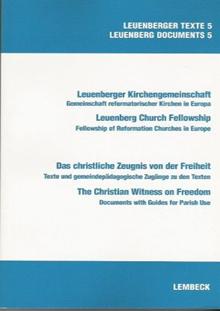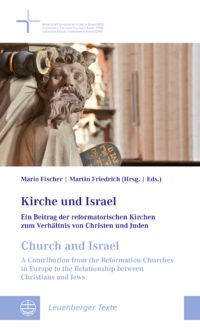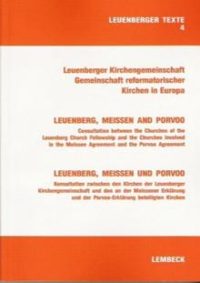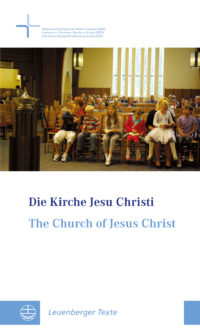Description
Volume 5 of the “Leuenberg Documents” is the response of the Executive Committee for the Leuenberg Church Fellowship to the frequent wish that the documents resulting from the Leuenberg doctrinal conversations be made available to as many interested parties as possible. This bilingual series hopes to make these documents available internationally for work in parishes, house groups, synods, ecumenical talks, academies or theological seminars.
Earlier documents in the series covered ecclesiology (Vol. 1), the sacraments, ministry and ordination (Vol. 2), criteria of ethical decision making (Vol. 3) and the question of church fellowship between the churches of the Leuenberg Agreement and those covered by the Meissen and Porvoo Declarations (Vol. 4). The documents in Volume 5 on “The Christian Witness to Freedom” contain the results of conversations conducted during the profound political changes in Eastern and Western Europe from 1989 onwards, which had more effect than usual on theological consultations. Only a small majority voted in favour of the issue at the 3rd Assembly of the Leuenberg Church Fellowship in Strasbourg in March 1987. The delegates did not know what political changes Europe was to undergo from 1989 onwards, nor how important the question of “freedom” would become.
The two studies on “freedom”, by a project group established in the autumn of 1989 and, from 1992, also by the “Southern/Eastern Europe Regional Group” led by Bishop J. Hanselmann, became a living account of European history. The resulting documents do not claim to offer a consensus; they deliberately reflect different emphases and specific experiences of “freedom”. The first version of the project group’s report was submitted in French – probably a unique event in the Leuenberg doctrinal conversations. The spirit and verve of the French tradition of freedom can be sensed as one studies the document. The Southern/Eastern Europe Regional Group (“South Europe” till the General Assembly in 1994), on the other hand, concentrates more on the freedom and captivity of the church. This reflects experiences of socialism and communism among the churches of Eastern Europe over the past 40 years.
The Executive Committee submitted both documents with its comments to the 4th General Assembly. They were received with gratitude and the resolution adopted that both studies be made available with guides for congregational use, so that the best possible advantage could be taken of them. Here, the Executive Committee expresses its gratitude to Prof. Hartmut Jetter, Stuttgart, for the guide he has produced on the two documents. His title, “Learning Freedom – Practising Freedom”, indicates the aim of the two seminar series he proposes. Our thanks are also due to Prof. Theo Witvliet, Naarden, for the guide, “Freedom in Responsibility”, which reflects the historical background to the Dutch sense of freedom as well.



